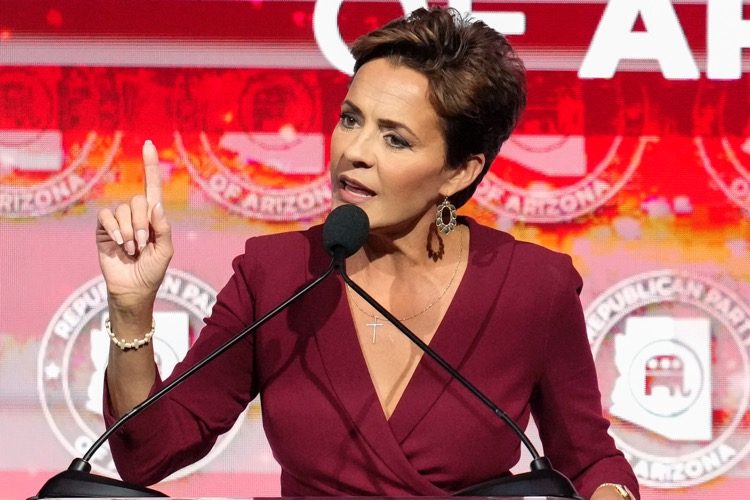
A conflict continues to rage within the GOP for influence over the party. Even as Donald Trump remains the front-runner in the Republican presidential primary, with a commanding lead over his crowded field of opponents, officials within the party are worried that fervent Trump supporters running for the U.S. Senate could cost the GOP seats needed to retake control of the chamber.
One prominent race is in Nevada, where Republican Jim Marchant is challenging Senator Jacky Rosen (D-Nev.). Marchant, a former state assemblyman, has waded into Qanon, and refused to concede his lost race last year when he ran for secretary of state. He also unsuccessfully ran for Congress in 2020.
In Arizona, Republican officials are biting their nails at the hints that Kari Lake, the gubernatorial candidate from 2022 who refused to concede to Democratic Governor Katie Hobbs, has talked about potentially entering the U.S. Senate race.
The Arizona U.S. Senate race is one that Republicans keenly hope to win. Arizona was long a bastion for Republicans, but the statewide offices went solidly blue in the last few election cycles. The incumbent in 2024, Kyrsten Sinema, is on her first term. She was elected as a Democrat but changed to Independent during her term, influenced in part by the backlash she has received from the base of her party for occasionally siding with the Senate’s Republicans.
As a result, Democrats are holding a primary to choose a nominee to run against Sinema. The GOP sees this as an opportunity to take the seat back, but establishment insiders fear that opportunity could be jeopardized with a candidate such as Lake on the ballot.
Other controversial candidates are mulling bids in states such as Wisconsin and Montana, putting some Republicans on edge.
Barrett Marson, an Arizona-based GOP strategist, told The Hill: “Certainly, one thing some of these MAGA and more far-right candidates have in common is they are a glutton for punishment, and they don’t mind being humiliated at the ballot box.”
After the GOP won only a narrow majority in the House and failed to retake the Senate in the 2022 midterms, the National Republican Senatorial Committee (NRSC) declared that they will take a more active role in recruiting candidates and in supporting those candidates during primaries this cycle.
Senator John Cornyn (R-Texas), who chaired the NRSC in the 2010 and 2012 elections, said earlier this year, “I think we’ve seen what happens when we nominate people who can win a primary but can’t pivot toward a general election and get the broad support you need to win. You don’t get to govern if you can’t win an election. Winning is the first important step.”
The NRSC has gotten heavily involved in primaries in past election cycles, notably in 2014 after losing what were considered winnable contests in previous elections. Following disappointing results in 2022, the establishment wing appears unwilling to leave nominations up to voters again.
One race where the party swiftly got involved is in West Virginia’s Senate race, where the GOP hopes to knock out longtime Democrat Senator and former Governor Joe Manchin. Although Representative Alex Mooney, a Freedom Caucus stalwart, is in the race, the NRSC quickly anointed Governor Jim Justice as their nominee, lavishing him with key endorsements — giving him an immediate bump in the polls upon entering the race.
Despite the establishment support behind Justice, Mooney has refused to go away. “There is no scenario by which I won’t be on the ballot on May 14,” Mooney told Politico, adding that he was “disappointed” with the NRSC’s decision to get behind Justice.
Even as the establishment moves to consolidate against Trump-aligned firebrands in Senate races, the Trump camp is making gains when it comes to winning delegates for the GOP convention.
As Politico reports:
In late June, California GOP Chair Jessica Millan Patterson and RNC committee members Harmeet Dhillon and Shawn Steel floated a new set of delegate selection rules that could make their state more competitive in the GOP nomination process.
Blindsided by the proposal — which would potentially allow lower finishers to claim more delegates than under the previous system — Trump’s aides and allies jumped into action and called state leaders to complain.
… Within days, Patterson, Dhillon and other authors of the original proposal had all but abandoned their plan. And last weekend, the executive committee of the California GOP overwhelmingly adopted rules that Trump’s team supported — awarding all of the state’s delegates to the candidate who secures more than half of the statewide vote, which Trump campaign aides believe he will do.
The establishment members of the Republican Party find themselves in an interesting conundrum: They want to break free of Trump (in part because they believe that Trump is dragging down their down-ballot), yet the influence of Trump remains so strong with the base that they find themselves begrudgingly forced to make concessions to the man widely acknowledged as the presumptive nominee.




